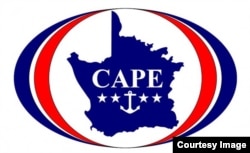JOHANNESBURG, SOUTH AFRICA —
South Africa’s next general election is to happen on May 7. Political analysts expect the ruling African National Congress (ANC) to again triumph.
The ANC has been in power since the country’s first democratic polls in 1994, following decades of apartheid, and received almost 66 percent of the vote during the last election in 2009.
But some observers say this figure could fall significantly this year, because of widespread dissatisfaction with the party’s ability to deliver essential services and its failure to end massive unemployment and poverty. The ANC and its leader, and the country’s president, Jacob Zuma, are also mired in several corruption scandals.
While the focus remains firmly on the ANC ahead of the 2014 vote, many other smaller parties are set to participate in the polls. One of them is the Cape Party, led by Jack Miller, a 29-year-old former actor and model.
“I formed the Cape Party because it was becoming increasingly clear that the ANC government had no intention of implementing policies that intended to create a rainbow nation, but rather were dividing people on the basis of skin color, destroying the country’s economy, infrastructure and education system, while at the same time stealing everything they could,” he said.
A declaration of Cape independence
Miller’s movement is based in Cape Town, the capital city of South Africa’s Western Cape Province. Its tourism and wine industries generate billions of rand every year.
The Cape Party wants the Western Cape to secede from South Africa.
Miller argued that the independent country of the Cape Republic, “with good economic and political policies,” will be “far more productive,” to the benefit of all South Africans.
“The remainder of South Africa would have an open trading partner that would boost their economy, providing affordable goods and services, excess electricity or water, if needed. Basically, all of the benefits of a flourishing economy would be right next door,” he told VOA.
Miller insisted that the Cape Republic would not be a “separatist enclave.”
“If there are people who don’t like the policies of the South African government, then they can always migrate and bring their skills down to us in the Cape,” he said.
Other politicians say the country’s constitution outlaws provincial secession, but Miller disagreed. He pointed to an article in the charter that says all South Africans have a right to self-determination.
“The Cape has a unique culture, languages and religions so we should be able to make our own laws,” he said.
Miller is convinced that “certain powerful precedents” support the feasibility of Cape secession. “Just look at the borders of South Africa itself – Lesotho and Swaziland. These are independent countries within the borders of South Africa,” he said.
Miller charges the ANC with discrimination
Miller claimed that the ANC uses its power to discriminate against those perceived to be opposed to it. As an example, Miller said all big contracts and tenders are awarded not to the most skilled people, but to friends of the ANC.
“This is what the apartheid government did when they took control and this is what the ANC is doing now. If we want to put an end to discrimination in this country, we need to decentralize the decision-making power of a central government and return it to the local communities.”
Miller is adamant that transforming South Africa’s unique regions into independent, well-governed countries will result in peace and prosperity.
“When you take power back, when you decentralize it, you don’t have the same types of conflict and friction that develop between different communities when they are forced to battle each other head to head for the cake that the central government is dishing out,” he stated.
Get rid of affirmative action
The Cape Party wants to end the ANC policy of black economic empowerment. BEE, as it’s known in South Africa, gives preferential treatment to black business people.
“BEE is an unbelievably destructive economic weapon against all non-blacks in South Africa who are trying to create businesses, provide employment and grow the amount of value in society,” said Miller. “The madness gets worse when, after 20 years, it becomes blatantly obvious that BEE is simply a smokescreen tactic for government officials, their families and business relations to make an absolute fortune off the taxpayer.”
The Cape Party says there’s also no need for affirmative action - a practice that reserves many top jobs for black South Africans.
“Some of these people are not qualified for their positions,” Miller emphasized. “We’ve had 20 years of these racially discriminative economic and political policies which have driven out most of the expert and skilled labor needed to drive a first-world country. For example, technicians to keep the power stations running, or specialists to ensure that our drinking water is safe to drink …”
Miller argues for tax reform
Miller said the Cape Party would transform South Africa’s tax system, reducing the tax burden on individuals.
“We have tax rates higher than first-world countries like the USA, Britain and France!” he exclaimed.
According to his party’s research, less than 10 percent of South Africans pay tax. Miller said this tiny, overtaxed minority effectively subsidizes the rest of the country.
Miller stressed that this is “grossly unfair” and “destroys the incentive to work” among the majority.
He added, “Then, of the taxes that are collected, that should go to improving the country, huge sums are swallowed up by a grossly oversized bureaucracy, misspent on incompetent and inflated tender programs or outright stolen.”
Miller acknowledged that lack of funding is hampering the Cape Party’s efforts to garner support. But this isn’t stopping him from campaigning for South Africans’ votes.
“They should vote for us because they’re sick and tired of being discriminated against because they’re the wrong skin color this season.
“They should vote for us because they’re sick and tired of being patronized and treated like a child because they happen to be the right skin color this season.
“They should vote for us because they want to live in a different world, a world of abundance, a world in which you are born free and treated equally,” he said.
But several bigger political groups have dismissed the Cape Party as a “joke” – something that doesn’t faze its ebullient leader.
“If they continue to dismiss us, I would respond with a quote from (Indian liberation leader) Mahatma Gandhi which says: ‘First they ignore you, then they laugh at you, then they fight you, then you win.’”
Miller maintained that his dream of a Cape Republic will never die, no matter how good or bad his party’s performance in the forthcoming election.
The ANC has been in power since the country’s first democratic polls in 1994, following decades of apartheid, and received almost 66 percent of the vote during the last election in 2009.
But some observers say this figure could fall significantly this year, because of widespread dissatisfaction with the party’s ability to deliver essential services and its failure to end massive unemployment and poverty. The ANC and its leader, and the country’s president, Jacob Zuma, are also mired in several corruption scandals.
While the focus remains firmly on the ANC ahead of the 2014 vote, many other smaller parties are set to participate in the polls. One of them is the Cape Party, led by Jack Miller, a 29-year-old former actor and model.
“I formed the Cape Party because it was becoming increasingly clear that the ANC government had no intention of implementing policies that intended to create a rainbow nation, but rather were dividing people on the basis of skin color, destroying the country’s economy, infrastructure and education system, while at the same time stealing everything they could,” he said.
A declaration of Cape independence
Miller’s movement is based in Cape Town, the capital city of South Africa’s Western Cape Province. Its tourism and wine industries generate billions of rand every year.
The Cape Party wants the Western Cape to secede from South Africa.
Miller argued that the independent country of the Cape Republic, “with good economic and political policies,” will be “far more productive,” to the benefit of all South Africans.
“The remainder of South Africa would have an open trading partner that would boost their economy, providing affordable goods and services, excess electricity or water, if needed. Basically, all of the benefits of a flourishing economy would be right next door,” he told VOA.
Miller insisted that the Cape Republic would not be a “separatist enclave.”
“If there are people who don’t like the policies of the South African government, then they can always migrate and bring their skills down to us in the Cape,” he said.
Other politicians say the country’s constitution outlaws provincial secession, but Miller disagreed. He pointed to an article in the charter that says all South Africans have a right to self-determination.
“The Cape has a unique culture, languages and religions so we should be able to make our own laws,” he said.
Miller is convinced that “certain powerful precedents” support the feasibility of Cape secession. “Just look at the borders of South Africa itself – Lesotho and Swaziland. These are independent countries within the borders of South Africa,” he said.
Miller charges the ANC with discrimination
Miller claimed that the ANC uses its power to discriminate against those perceived to be opposed to it. As an example, Miller said all big contracts and tenders are awarded not to the most skilled people, but to friends of the ANC.
“This is what the apartheid government did when they took control and this is what the ANC is doing now. If we want to put an end to discrimination in this country, we need to decentralize the decision-making power of a central government and return it to the local communities.”
Miller is adamant that transforming South Africa’s unique regions into independent, well-governed countries will result in peace and prosperity.
“When you take power back, when you decentralize it, you don’t have the same types of conflict and friction that develop between different communities when they are forced to battle each other head to head for the cake that the central government is dishing out,” he stated.
Get rid of affirmative action
The Cape Party wants to end the ANC policy of black economic empowerment. BEE, as it’s known in South Africa, gives preferential treatment to black business people.
“BEE is an unbelievably destructive economic weapon against all non-blacks in South Africa who are trying to create businesses, provide employment and grow the amount of value in society,” said Miller. “The madness gets worse when, after 20 years, it becomes blatantly obvious that BEE is simply a smokescreen tactic for government officials, their families and business relations to make an absolute fortune off the taxpayer.”
The Cape Party says there’s also no need for affirmative action - a practice that reserves many top jobs for black South Africans.
“Some of these people are not qualified for their positions,” Miller emphasized. “We’ve had 20 years of these racially discriminative economic and political policies which have driven out most of the expert and skilled labor needed to drive a first-world country. For example, technicians to keep the power stations running, or specialists to ensure that our drinking water is safe to drink …”
Miller argues for tax reform
Miller said the Cape Party would transform South Africa’s tax system, reducing the tax burden on individuals.
“We have tax rates higher than first-world countries like the USA, Britain and France!” he exclaimed.
According to his party’s research, less than 10 percent of South Africans pay tax. Miller said this tiny, overtaxed minority effectively subsidizes the rest of the country.
Miller stressed that this is “grossly unfair” and “destroys the incentive to work” among the majority.
He added, “Then, of the taxes that are collected, that should go to improving the country, huge sums are swallowed up by a grossly oversized bureaucracy, misspent on incompetent and inflated tender programs or outright stolen.”
Miller acknowledged that lack of funding is hampering the Cape Party’s efforts to garner support. But this isn’t stopping him from campaigning for South Africans’ votes.
“They should vote for us because they’re sick and tired of being discriminated against because they’re the wrong skin color this season.
“They should vote for us because they’re sick and tired of being patronized and treated like a child because they happen to be the right skin color this season.
“They should vote for us because they want to live in a different world, a world of abundance, a world in which you are born free and treated equally,” he said.
But several bigger political groups have dismissed the Cape Party as a “joke” – something that doesn’t faze its ebullient leader.
“If they continue to dismiss us, I would respond with a quote from (Indian liberation leader) Mahatma Gandhi which says: ‘First they ignore you, then they laugh at you, then they fight you, then you win.’”
Miller maintained that his dream of a Cape Republic will never die, no matter how good or bad his party’s performance in the forthcoming election.








